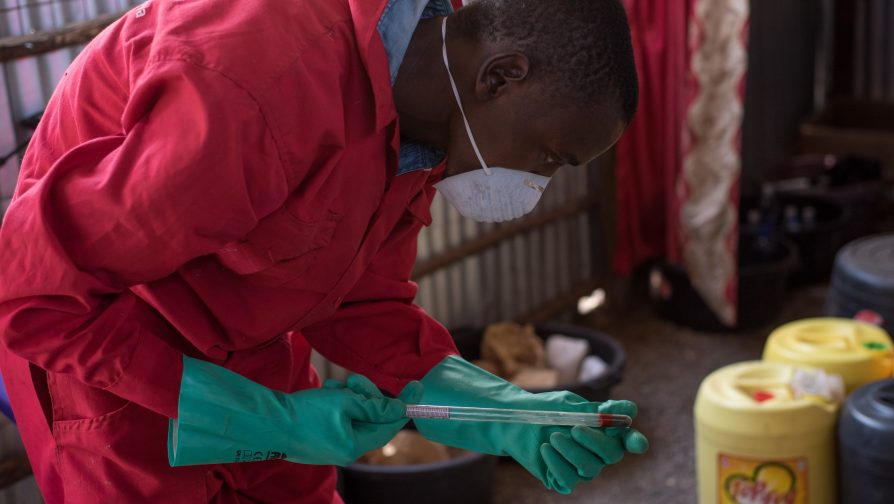“Getting the permit and endorsement of the Kenya Bureau of Standards has opened up more opportunities for my business as people now trust the quality of my products.”

nnocent Havyarimana, a refugee from Burundi who lives in Kakuma camp. “I use the internet a lot to conduct research on how to make different types of soap products for my clients. I learnt the theory in Burundi where I studied chemistry”. ©UNHCR/Samuel Otieno
Innocent Havyarimana, a 32 year old refugee from Burundi living in Kakuma Refugee Camp in northern Kenya carefully ties seven large jerry cans full of liquid soap to his motorbike. Its early morning and he is on way to make his first delivery of soap to the local government offices, and then to a girls boarding school in Kakuma town. Innocent says the two are among the biggest customers of his homemade soap products. Innocent is happy to have his own business which brings income for him and his family.
He fled Burundi 2013 just after completing a chemistry course at his local university, and working as an intern at a local chemical company. When he arrived in Kakuma he decided he wanted to try and keep working, and so decided to try soap making with the knowledge he gained back in Burundi.
To get started, members of Innocent’s family back in Burundi loaned him 1000 Kenya shillings to start Glap Enterprises
He was also able to access a loan of 50,000 Kenya Shillings ($500) from the UN Refugee Agency – UNHCR’s supported ‘Revolving Loan Fund’ to expand. Innocent’s business, Glap Enterprises, is one of over 2,000 informal businesses owned by refugees and Kenyans in Kakuma Refugee Camp.
“I use the internet a lot to conduct research on how to make different types of soap products for my clients, Innocent says. I learnt the theory part back in Burundi when I studied chemistry”.

Innocent prepares liquid soap at his homestead in Kakuma Refugee Camp, where he has set up a laboratory for soap production. ©UNHCR/Samuel Otieno
Using the skills he learnt in Burundi, Innocent contributes positively to the local economy. He is also passing on his soap making skills to other refugees and Kenyans with the hope of helping them start their own soap production businesses.
“My clients come from both the refugee and local communities, with majority of my clients being from the local community. Innocent says his soap sells well because the price is ‘pocket friendly’ meaning inexpensive— “I sell a litre of soap at 100 Kenya Shillings ($1),” he says. Innocent’s products include liquid antiseptic, bleach, baby soap, liquid soap and hair shampoo.
Innocent is happy to have his own business which brings income for him and his family
“I purchase raw materials from Nairobi, the Kenyan capital. I either travel to Nairobi when I have the required travel documents, or order online and have the chemicals delivered through the local bus companies.”
Innocent’s soap products have done so well that the Kenya Bureau of Standards (KEBS) has now endorsed his products and issued a one year permit to use the Kenyan standardization quality mark on what he produces. This mark is the mandatory product certification for all locally manufactured and imported commodities that ensures products meets the standards of quality or description. “Getting the permit and endorsement of the Kenya Bureau of Standards has opened up more opportunities for my business as people can now trust the quality of my products.”
However, limited access to financial support from banks for refugees remains a hurdle for many refugee business owners and entrepreneurs. Some refugees have access to the Village Loans and Savings Associations (VSLAs). These are refugees and host community organised groups where members contribute money to loan out to members on a monthly rotational basis. There are currently 240 such VSLA groups in Kakuma camp and Kalobeyei settlement with nearly 23 million Kenya shillings in savings ($230,000). But its a drop in the ocean of what’s required to grow and develop refugee owned enterprises.
UNHCR, through partners, facilitates the process of acquiring business permits
Edith Ingutia, Assistant Livelihoods Officer in UNHCR office in Kakuma says that more needs to be done to help owners like Innocent and others start and grow their businesses.
“UNHCR, through partners, facilitates the process of acquiring business permits from local authorities which is the first step to helping refugees start their business. The permits allow refugees to access the Revolving Loan Fund. Refugee entrepreneurs whose business have been operational for a minimum of six months qualify to access loans of 5,000 to 100,000 Kenya Shillings ($50 to $1000). A total of over 7 million Kenya shillings ($70,000) has been accessed by over 800 refugee entrepreneurs in Kakuma refugee camp”

Innocent meticulously checks for the PH level as one of the processes in making liquid soap ©UNHCR/Samuel Otieno
However, this is not enough. Refugees usually face obstacles in starting business with acquiring business permits and access to credit facilities. UNHCR is working on livelihoods rights, policies and regulations improvement through private sector partners engagement to facilitate ownership and access to productive assets pegged on Cash Based Intervention (CBI) initiatives. As a measure to increase and diversify incomes, UNHCR hopes to strengthen Community Based Organizations (CBOs) engagement approach that will integrate refugees in the supply and demand service and products value chains to access support services and markets.
Hopefully if such changes take place… refugees like Innocent will be able to start businesses that offer services to refugees and the host community that benefits the communities and economy.
Share on Facebook Share on Twitter